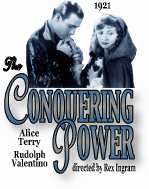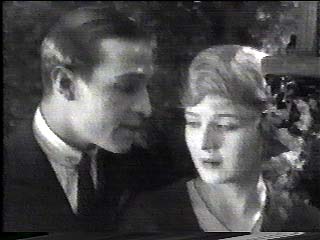

Metro Pictures
Cast: Alice Terry (Eugenie Grandet), Rudolph Valentino (Charles
Grandet), Eric Mayne (Victor Grandet), Ralph Lewis (Pére
Grandet), Edna Demaurey (his wife), Edward Connelly (Notary Cruchot),
Georg Atkinson (his son), Willard Lee Hall (The Abbé),
Mark Fenton (Monsieur des Grassins), Bridgetta Clark (his wife),
Ward Wing (Adolphe des Grassins), Mary Hearn (Nanon), Eugene Pouyet
(Cormoiller), Andrée Tourneur (Annette)
While Charles Grandet was living the life of a pampered rich young man in Paris, his father's financial world was collapsing around him. Victor Grandet doesn't tell his son of his financial woes. Instead, Charles is sent on a visit to Pére Grandet's, Victor's brother whom he has not seen in 25 years. It is while Charles is visiting his uncle in the small village of Noyant that his father commits suicide due to his financial ruin and heavy debts.
Pére bears no love for his nephew, but sees in the situation a way to make Victor's estate solvent and realize a profit from it. This he does without anyone's knowledge. Once accomplished, he convinces Charles to sign over all of his father's estate. Charles does this readily thinking the estate is worthless.
Although Pére is a very rich man,
he lives in the village as any other commoner. However, there
is a stone-walled room in his home where he keeps all his gold
locked away, much of it behind a loose stone in the wall. He is
greedy and shows no sympathy for those who owe him money,  even to the point of putting an elderly man
and his wife out of their home.
even to the point of putting an elderly man
and his wife out of their home.
In addition to his wife, Pére has a beautiful daughter, Eugenie, whom he is trying to teach to horde money as he does. Each birthday, he gives her one gold louis. The yearly ceremony requires Eugenie to bring the gold from its hiding place while he presents her with this year's gift of a new coin.
Because of her beauty and her father's wealth, Eugenie has two ardent suitors one, the son of Notary Cruchot, and the other, Adolphe des Grassin. She shows no interest in either. When Charles arrives, though, she shows an immediate interest.
As soon as Victor Grandet's estate is signed over, Pére arranges for Charles to go to the West Indies to seek his fortune and, more importantly, to get him out of the house and away from Eugenie. At one point Eugenie overhears her father say, "I'd rather see my daughter dead than married to Charles Grandet!"
Charles and Eugenie have since fallen in love, and, as he readies for his departure, they both vow their everlasting love for one another. Since Charles only has funds to pay for his passage to the West Indies, Eugenie convinces him to take all of the gold louis she has been receiving each birthday all unknown to her father.
Although Charles writes to Eugenie regularly, her father intercepts the letters, and she never sees them. Charles eventually receives only one letter from the Grandet household a letter from Pére saying his has made arrangements for Eugenie's marriage and suggests Charles never communicate with her again.
A year has passed, and Eugenie and her mother both wonder why they have never heard anything from Charles. It is her birthday, also, and, as is his usual ceremony, Pére asks Eugenie to get her gold coins. Eugenie panics, and her father realizes she has given them away. When Eugenie's mother tries to intercede, Pére strikes her, and locks his daughter in her room. Eugenie's mother dies as a result of the incident.
As time passes, the townspeople talk about how "crazy" Pére Grandet has become since his wife's death. They also talk about his ill-treatment of his daughter. Pére spends more and more time in his stone-walled room counting his money. He keeps a baby cradle full of the coins, covered with a blanket, and spends much time sitting beside the cradle and rocking it. He even delights in laying his head on the cradle and dropping the coins in a stream over his head.
One day the Notary comes in and reminds
Pére that he is the only one in the village who knows Eugenie
is not his biological child. She is the product of a first marriage
by her mother, a marriage which allowed the wife to bring a sizeable
fortune into her union with Pére. He also  reminds
Pére that Eugenie could demand that portion of his estate
if she wished.
reminds
Pére that Eugenie could demand that portion of his estate
if she wished.
The Notary points out that he is desirous to see a union between his son and Eugenie. He also says he has a paper which Eugenie can sign assuring Pére that she cannot touch his estate during his lifetime.
Pére unlocks Eugenie from her room and brings her in to the stone-walled room where he and the Notary have a paper for her to sign. Eugenie is so relieved at the change in her father's temperament that she does not question the paper and signs it readily. When he and the Notary step out for a moment, Eugenie looks on her father's desk in the room, which she has never approached, and finds several letters addressed to her from Charles. She also finds a letter that explains how Pére duped Charles out of his inheritance.
Pére finds her with the letters. Eugenie runs from the room. Pére slams the door behind her and, unknown to him, the huge lock he has on the door accidentally closes. While Eugenie goes to the garden to read her letters, Pére goes through the room like a madman to see what of his possessions has been disturbed. When he realizes he is locked in, his behavior worsens. He imagines he sees his dead wife, his brother Victor and the old man whom he put out of his home. He evens sees a horrible looking being personifying "gold" which spews gold coins from his mouth. In his madness, Pére pulls a large chest filled with gold on top of him, killing himself.
Eugenie inherits her father's wealth. Many years pass by, and her suitors continue in their quest. Finally, when both of her suitors and their families are in her home, she is told that Charles has returned to Paris and there are "rumours of a marriage to a wealthy young lady." With that, Eugenie finally announces that she will marry the son of Notary Cruchot.
Sad and heartbroken, she goes in to the garden by herself, a place that holds many memories of times with Charles. Suddenly, Charles, who has met with success because of Eugenie's loan, walks up. He has come back to see the garden one more time thinking that Eugenie surely doesn't even live there anymore. They soon clear up the misunderstandings that have kept them apart all these years and embrace never to part again. The Notary's son looks out the window and realizes he will not, after all, be marrying Eugenie Grandet.
Return to "The Conquering Power" page
copyright 2000 by Tim Lussier, all rights reserved